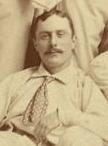| Back in the days of the 19th century, players were certainly more "bad ass" than they have been since. Of course, every generation has its good and bad people, but people in the 19th century toed the line of the law further than people of the next two centuries. At the time when hatred and bigotry were at all time highs, there is no surprise the level of crime that people at this time were capable of committing. Even "Old Hoss" Radbourn was known as a bit out there during his time, as was Cap Anson and many others to play during that time. |
The following season, Larkin, who was a position player- reserve pitcher before, was now a full time pitcher. He was hired by the Harford of Brooklyn club of the National League, where he would start 56 out of the 60 games the team would play. He completed 55 out of his 56, going 29-25, 2.14 pitching 501 innings. The 25 losses led the NL and the ERA was not legit in that time as pitchers would give up more than twice the amount of earned runs- not to mention the amount of errors pitchers made to contribute to their own trouble. Larkin gave up 285 runs, 119 of which were earned. 1878 would see him pitch for the Chicago White Stockings, where he pitched in 56 games once again, this time completing all of them and finishing with a 29-26 record, 2.24 ERA and 506 IP. The next season, he returned to the White Stockings (the ancestors of the Cubs) and went 31-23, 2.44 in 58 games, completing 57 of them and pitching just over 513 innings.
Not surprisingly, Larkin developed arm trouble during the 1879 season. In spite of pitching in a career high of games and innings, he stepped aside to allow Frank Hankinson become the main pitcher under manager Anson. (Also on that team was the pioneer of baseball catchers- Silver Flint, also profiled on bases empty blog.) After a hideous display of pitching (0-5, 8.76 in 5 starts, 38 IP, 65 R, 37 ER, 83 H, 10 BB) at the beginning of 1880, he was released by the Troy Trojans. This would send Larkin out of organized baseball all together.
Not playing professional baseball seemed to weigh on Larkin. After more than three years off, he seemed to lose it. He assaulted and shot at his wife, then shot a police officer, leading to his arrest. His attempt was to kill his wife, then himself. Perhaps he should have stuck to playing baseball as he was a terrible murderer. His wife played dead, convincing Larkin he had killed her and Larkin failed to kill himself by slitting his wrist. He also tried to kill himself the next day, once again failing miserably. Larkin's wife, just as crazy as Terry was, refused to press charges though her husband's attempt was to kill her. Larkin was released from the prison where he had sat since his arrest.
A couple months later, on February 18, 1884, Larkin was in the news again. This time, he threatened to shoot his father. Oddly enough, after he was released this time, he was signed by the Richmond Virginians where he played as a 2B. The team replaced the Washington Nationals of the American Association midway through the year. Done pitching, he still managed to hit .201 (28-139) which was slightly below his career average as a pitcher. For his career, Larkin hit .234 with 198 hits, 29 2B, 15 3B and 1 HR.
Larkin's fortunes never got any better. He was institutionalized in 1894 for challenging his former employer to a duel involving guns. While he was in the asylum, he successfully managed to slit his own throat, ending his life. Though his birth date was never confirmed, it was said he was 38 when he killed himself.
Looking back at that time, I am sure that fans probably had a fear of going to a ballpark knowing people like that were playing. I mean, if you say the wrong thing to one of these players, the would be likely to kill you. Not everybody was a Terry Larkin, but a lot of players of that time had their issues. I look at this man as an extremely disturbed individual who benefited from his skill throwing a baseball. This skill kept him out of prison and likely saved people(s) lives. Pitching everyday and preparing to pitch the next day by keeping his hurting arm strong kept the man out of trouble, especially with his family. I think of him as more of a criminal than a ballplayer. But I am glad he played, because it probably saved somebody's life.




 RSS Feed
RSS Feed
